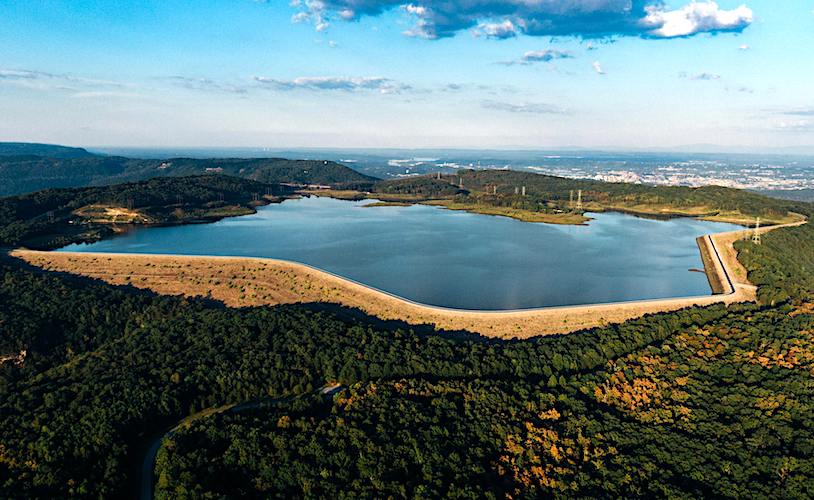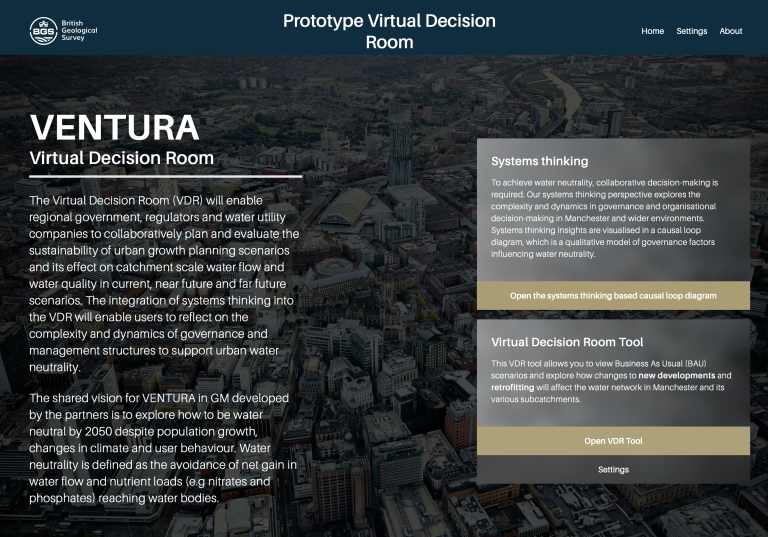Virtual Decision Rooms for Water Neutral Urban Planning (VENTURA)
Ventura is a collaborative research project between Imperial College (ICL), University College London (UCL) and the British Geological Survey (BGS).

15 April 2024
The VENTURA project is schedule to run from October 2021 to April 2024) and was funded by the UK Research and Innovation (UKRI) under the Engineering and Physical Sciences Research Council (EPSRC) as part of a programme entitled, 'Digital Economy: Sustainable Digital Society'.
The project team for this collaborative project include academics from ICL, UCL and the BGS and the UCL Ventura team is led by Nici Zimmermann, Ke (Koko) Zhou, Irene Pluchinotta and Pepe Puchol-Salort. The broader aim of Ventura is to support water neutrality decisions through digital tools.
The UCL team led the participatory systems thinking activities in case studies in Greater Manchester and Enfield, London. They engaged with a range of stakeholders including the trilateral group, namely Greater Manchester Combined Authority, United Utilities, and the Environment Agency. They also engaged with local boroughs, the Greater London Authority, and broader environmental stakeholders. The aim of the project's stakeholder engagement activities is to understand stakeholders’ experience and perspectives of the water neutrality governance challenges and complexities, supporting the exploration of the interconnections between hydrological and institutional dynamics towards sustainable growth.
The team employed comprehensive participatory approaches: identifying challenges with stakeholders and mapping the complex core problem. They developed connection circles and causal loop diagrams (CLDs) representing the system's complexity. The team drew from systems thinking, behavioural operational research, and organisational management studies (institutions, attention and emotions) to inform their reflections on the CLDs. They also analysed the decision-making process and compared stakeholders’ perceived boundaries of the system, specifically on how different groups of stakeholders perceive the system differently, and their reflections to achieve integrated decision-making.
 Figure: Manchester workshop, causal loop diagrams developed by stakeholder groups
Figure: Manchester workshop, causal loop diagrams developed by stakeholder groups

In their collaborated with Imperial College London and the British Geological Survey integrating systems modelling and CLDs in a digital tool, the UCL team called a virtual decision room (VDR) for the Manchester case study. They used this combination of systems thinking with GIS-based modelling in a virtual decision room to enhance practical decision-making by offering an easily accessible interface. This integration facilitates a holistic understanding of specific policy issues and broader governance challenges.
The VENTURA project operated in an highly interdisciplinary setting, and it followed principles of transdisciplinary, and they also used it as a basis to reflect on the process of collaborating across disciplines and working with stakeholders—with the aim to better understand the development of digital tools in participatory, inter- and transdisciplinary contexts.
For more information about the project, please visit following resources. If there are specific questions about the project, you are welcome to contact the team directly.
 Figure: the VENTURA virtual decision room
Figure: the VENTURA virtual decision room

Publications and conference papers:
VENTURA - virtual decision rooms for water neutral planning https://nora.nerc.ac.uk/id/eprint/535476/
Comparisons of Emotional Boundaries: A case study of water neutrality and sustainable urban development in London: https://discovery.ucl.ac.uk/id/eprint/10180093/
Other documents:
Ventura VDR and the CLD: https://ventura.bgs.ac.uk
Ventura project summary and more details about the development of CLD: https://www.imperial.ac.uk/systems-engineering-innovation/research/ventura/
Ventura Github: https://github.com/ventura-water
Researchers (with profile links):
Image credit: pexels.com
 Close
Close

